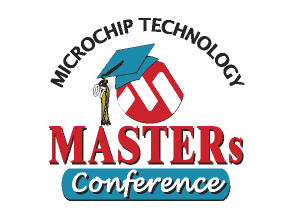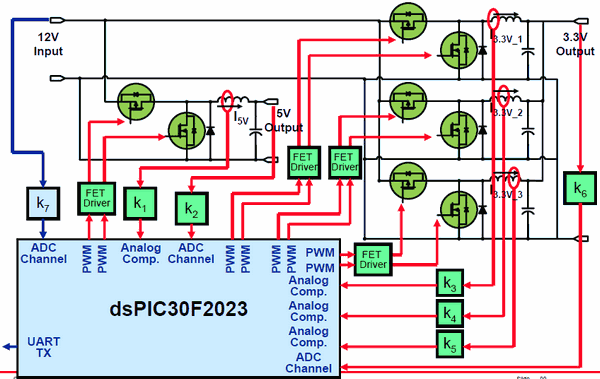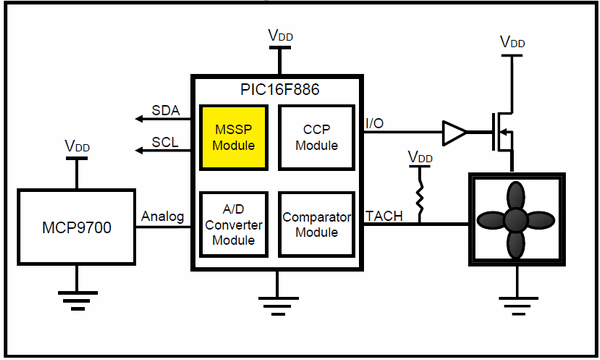
Microchip firmasının ileri seviye programlama, PIC, DSPIC hakkında bir çok bilginin (ingilizce) bulunduğu PDF formatında konferans notları ayrıca dökümanlarda bulunan uygulamaların kaynak C30 kodları kütüphane dosyaları bulunuyor
Notlar ingilizce olsada çok önemli bilgiler var ayrıca görseller, diagramlar çok açıklayıcı
Lab1 Basit Uyaran
Lab2 Mantık Analizörü
Gömülü Mühendisler için LCD Uygulamalı
LCD Laboratuvar Broşürü
16-bit Gelişmiş Çevre Birimleri Dağıtımı
16-bit Mimari C30 Standart Çevre Birimleri
16-bit Mimari, Standart Çevre Birimleri ve C30 Kullanarak Programlama
16-bit Temel Çevre Birimleri ve C30 Kullanarak Programlama
16-bit DSP Motoru ve DSP Kitaplıkları
204 ADV 16-bit Gelişmiş Çevre Birimleri
dsPIC30F ile AC Asenkron Motor Kontrolü
Sensör Uygulamaları için ACD Delta-Sigma Analogdan Dijitale Dönüştürücüler
Gelişmiş 16 bit Çevresel Konfigürasyon MPLAB C30 Programlama
Gelişmiş 16-bit Çevresel Yapılandırma
MPLAB C30’daki Gelişmiş Özellikler
Gelişmiş SMPS Analog ve Dijital Kontrol Teorisi
dsPIC DSC SMPS Ailesini kullanan Gelişmiş SMPS Uygulamaları
BDC Fırçalı DC Motor Kontrolünü Akıllıca Kontrol Ediyor
BDC Fırçalanmış DC Motorları Akıllıca Kontrol Eder
Fırçalanmış DC Motor Bildirimi PWM
PIC16 ve PIC18 MCU’lar ile PC Seri Port üzerinden iletişim kurun
CCS C Compiler Advanced Techniques’in Anlaşılması
Veri EEPROM Emülasyonu PIC18, PIC24 dsPIC33F Flaş Cihazları
MPLAB Simülatörlerinde Uyaran Kullanan Hata Ayıklama Teknikleri
Gömülü Sistemlerde Gürültü için DFN Tasarımı
Dijital Potansiyometrelerle DGP Uygulamalı
DIF Akıllı Motor Kontrolü Bir Fan Uygulaması
dsPIC30F6010A kullanan Dijital Güç Faktörü Düzeltme PFC’si
Gömülü Sistemler için DSO Hata Ayıklama Teknikleri
DSP uygulaması dsPIC Dijital Sinyal Denetleyicisi DSC
DSP Tanıtımı Sinyal İşleme dsPIC Dijital Sinyal Denetleyicileri DSC’ler
DSP Özelliklerini Kullanan DSP dsPIC DSC Mimarisi
dsPIC DSC Motor Kontrol Atölyesi
dsPIC Motor Kontrol Atölyesi
Gömülü C Programlama Uygulamalı Alıştırmaları
C Kullanarak Gömülü Programlamaya EPC Giriş
EXP 16-bit Gelişmiş Çevre Birimleri
EXP Uygulamalı Sınıf Çözümleri pps
FOC dsPIC DSC ile PMSM için Sensörsüz FOC
Mikroçiplerde FreeRTOS.org
Tam Hızlı USB Uygulamalı Eğitimi
Başlarken 16-bit Mimari Komut Seti Derleme Programlama
GNU Linker’ı Hacklemek
Microchip TCPIP Stack ile uygulamalı çalışma 8 saat
HTC, HI-TECH PRO C Derleyicisini Kullanıyor HI-TIDE C-Wiz ile Tanışın
PICkit Serial Analyzer kullanarak IC Geliştirme
I2C Termal Denetleyici PIC Mikrodenetleyicisini Uygulama
Akıllı Güç Kaynağı Tasarımı Giriş
ZigBee ve Mikroçipler ZigBee Stack’e Giriş
Giriş Görsel Aygıt Başlatıcı (MPLAB IDE VDI)
Linux Ortamında Mikroçip için LNX Gömülü Tasarım
Düşük Maliyetli Fırçalı DC Motor Kontrolü
16-bit PIC Mikrodenetleyiciler için Mikroçipler IrDA Standart Yığın
MPLINK Linker kullanan MPL Modüler Kodlama Teknikleri
Gelişmiş Kullanıcılar için MPLAB Devre İçi Hata Ayıklayıcılar
MS1 MPLAB Simülatör Temelleri
MS2 MPLAB Simülatörleri Gelişmiş Uyaran Ek Örnekleri
MS2 MPLAB Simülatörleri Gelişmiş Uyaran Laboratuvarı 1
MS2 MPLAB Simülatörleri Gelişmiş Uyaran Laboratuvarı 2
MS2 MPLAB Simülatörleri Gelişmiş Stimulus LAB 3
MS2 MPLAB Simülatörleri Gelişmiş Stimulus
MWI Mikroçip MiWi Kablosuz Protokolü
nanoWatt Teknolojisi Özellikleri İçeren PIC18 Mimarisi
PIC18 Çevresel Yapılandırma MPLAB C18 Derleyici Programlama
PIC18 Çevre Birimi Yapılandırması MPLAB C18 Derleyici Programlama2
PIC16F MCU’da PID Kapalı Çevrim Kontrolü
ÇHC PIC18F Çevre Birimleri
Tek Çok Fazlı Enerji Ölçüm Çözümleri Mikroçip
dsPIC Kullanımı SMPS Temelleri SMPS Dijital Sinyal Denetleyicileri DSC’ler
SPH G.726A ve G.711
TCH Magic Touch Kapasitif Dokunmatik Sensörler
Sıcaklık Veri Kaydedici Uygulamak için I2C EEPROM Kullanma
Uygulama Kitaplıklarını Mikroçip 16-bit Mikrodenetleyicilerle Kullanma
Hızlı Geliştirme Mikrodenetleyici Uygulamaları için CCS C Derleyicisini Kullanma
MPLAB IDE Proteus VSM Kullanarak Sanal Sistem Prototipleme 16-bit Cihazlar
Kablosuz Anten Tasarım Testi Mikroçip Teknolojileri Alıcı-Verici MRF24J40
Lab1 Simple Stimulus
Lab2 Logic Analyzer
LCD Hands-on for Embedded Engineers
LCD Lab Handout
16-bit Advanced Peripherals Hand Out
16-bit Architecture C30 Standard Peripherals
16-bit Architecture, Standard Peripherals and Programming Using C30
16-bit Basic Peripherals and Programming using C30
16-bit DSP Engine and DSP Libraries
204 ADV 16-bit Advanced Peripherals
AC Induction Motor Control with the dsPIC30F
ACD Delta-Sigma Analog to Digital Converters for Sensor Applications
Advanced 16 bit Peripheral Configuration MPLAB C30 Programming
Advanced 16-bit Peripheral Configuration
Advanced Features in MPLAB C30
Advanced SMPS Analog and Digital Control Theory
Advanced SMPS Applications using the dsPIC DSC SMPS Family
BDC Intelligently Controlling Brushed DC Motor Control
BDC Intelligently Controlling Brushed DC Motors
Brushed DC Motor Handout PWM
Communicate with PIC16 and PIC18 MCUs via the PC Serial Port
Comprehension of CCS C Compiler Advanced Techniques
Data EEPROM Emulation PIC18, PIC24 dsPIC33F Flash Devices
Debugging Techniques Using Stimulus within MPLAB Simulators
DFN Designing for Noise in Embedded Systems
DGP Hands-on with Digital Potentiometers
DIF Intelligent Motor Control A Fan Application
Digital Power Factor Correction PFC using dsPIC30F6010A
DSO Debug Techniques for Embedded Systems
DSP application dsPIC Digital Signal Controller DSC
DSP Introduction Signal Processing dsPIC Digital Signal Controllers DSCs
DSP Using the DSP Features dsPIC DSC Architecture
dsPIC DSC Motor Control Workshop
dsPIC Motor Control Workshop
Embedded C Programming Hands-On Exercises
EPC Introduction to Embedded Programming Using C
EXP 16-bit Advanced Peripherals
EXP Hands-on Class Solutions pps
FOC Sensorless FOC for PMSM with dsPIC DSC
FreeRTOS.org on Microchips
Full-Speed USB Hands-On Training
Getting Started 16-bit Architecture Instruction Set Assembly Programming
Hacking the GNU Linker
Hands on with the Microchip TCPIP Stack 8 hours
HTC Using HI-TECH PRO C Compiler Introducing HI-TIDE C-Wiz
IC Development using the PICkit Serial Analyzer
Implementing I2C Thermal Controller PIC Microcontroller
Intelligent Power Supply Design An Introduction
Introduction to ZigBee and Microchips ZigBee Stack
Introduction Visual Device Initializer (MPLAB IDE VDI)
LNX Embedded Design for Microchip in a Linux Environment
Low Cost Brushed DC Motor Control
Microchips IrDA Standard Stack for 16-bit PIC Microcontrollers
MPL Modular Coding Techniques using MPLINK Linker
MPLAB In-Circuit Debuggers for Advanced Users
MS1 MPLAB Simulator Fundamentals
MS2 MPLAB Simulators Advanced Stimulus Additional Examples
MS2 MPLAB Simulators Advanced Stimulus Lab 1
MS2 MPLAB Simulators Advanced Stimulus Lab 2
MS2 MPLAB Simulators Advanced Stimulus LAB 3
MS2 MPLAB Simulators Advanced Stimulus
MWI Microchip MiWi Wireless Protocol
PIC18 Architecture Including nanoWatt Technology Features
PIC18 Peripheral Configuration MPLAB C18 Compiler Programming
PIC18 Peripheral Configuration MPLAB C18 Compiler Programming2
PID Closed Loop Control on a PIC16F MCU
PRC PIC18F Peripherals
Single Polyphase Energy Metering Solutions Microchip
SMPS Basics Using dsPIC SMPS Digital Signal Controllers DSCs
SPH G.726A and G.711
TCH The Magic Touch Capacitive Touch Sensors
Using an I2C EEPROM to Implement a Temperature Datalogger
Using Application Libraries with Microchips 16-bit Microcontrollers
Using the CCS C Compiler for Rapid Development Microcontroller Applications
Virtual System Prototyping 16-bit Devices using MPLAB IDE Proteus VSM
Wireless Antenna Design Testing Microchip Technologys Transceiver MRF24J40
Şifre-Pass: 320volt.com
Yayım tarihi: 2010/10/17 Etiketler: c30 applications, dspic ebook, microchip conference, microchip konferans, microchip pic projeleri



kardeşim yapılan çalışmalar çok güzel çok teşekkür ederim